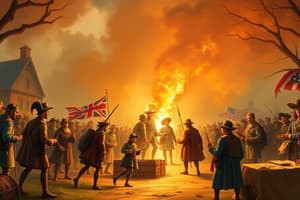Podcast
Questions and Answers
What did the colonists do to scare off tax collectors?
What did the colonists do to scare off tax collectors?
- Sent them threatening letters
- Asked them to leave politely
- Invited them for dinner
- Destroyed their offices (correct)
Which event led to the repeal of the Stamp Act by Parliament in March 1766?
Which event led to the repeal of the Stamp Act by Parliament in March 1766?
- British troops sent to the colonies
- Townshend Acts being passed in July 1767
- Violent protests by the colonists (correct)
- Successful boycott of British goods
What items were taxed under the Townshend Acts when imported into the colonies?
What items were taxed under the Townshend Acts when imported into the colonies?
- Lead, paint, glass, paper, tea (correct)
- Clothing, shoes, food, weapons
- Furniture, jewelry, electronics, vehicles
- Books, musical instruments, artwork, tools
How did the colonists respond to the Townshend Acts?
How did the colonists respond to the Townshend Acts?
Why were more British troops sent to the colonies in March of 1770?
Why were more British troops sent to the colonies in March of 1770?
Why did Great Britain choose to tax the colonists in the 1760s?
Why did Great Britain choose to tax the colonists in the 1760s?
What was the main purpose of the Proclamation of 1763 from the British perspective?
What was the main purpose of the Proclamation of 1763 from the British perspective?
What impact did the Sugar Act of 1764 have on the American colonies?
What impact did the Sugar Act of 1764 have on the American colonies?
How did most American colonists react to the Proclamation of 1763?
How did most American colonists react to the Proclamation of 1763?
What did citizens of Great Britain feel about paying for battles and protection that did not affect them?
What did citizens of Great Britain feel about paying for battles and protection that did not affect them?
Why were British soldiers sent to enforce the Proclamation Line in 1763?
Why were British soldiers sent to enforce the Proclamation Line in 1763?
Why were the colonists angry about the Stamp Act?
Why were the colonists angry about the Stamp Act?
What did the Quartering Act of 1765 require the colonists to provide?
What did the Quartering Act of 1765 require the colonists to provide?
What did the colonists believe was invalid about the taxes imposed by Great Britain?
What did the colonists believe was invalid about the taxes imposed by Great Britain?
How did some colonists protest against the Stamp Act?
How did some colonists protest against the Stamp Act?
What did the Stamp Act require to be displayed on papers to show that the tax was paid?
What did the Stamp Act require to be displayed on papers to show that the tax was paid?
Why did colonists feel they had no control over the taxes imposed by Great Britain?
Why did colonists feel they had no control over the taxes imposed by Great Britain?
Flashcards are hidden until you start studying
Study Notes
The Colonists' Revolt Against British Rule
- Colonists from different colonies joined together to boycott British goods and refused to pay taxes imposed by the British government.
The Stamp Act and Its Consequences
- The British government passed the Stamp Act in 1765, which placed a tax on printed materials, such as newspapers, pamphlets, and playing cards, in the colonies.
- The tax required a large blue stamp to be displayed on each item, and the revenue generated would go to the British government.
- News of the Stamp Act sparked widespread outrage among the colonists, who felt they had no say in making these laws and were being subjected to "taxation without representation."
The Colonists' Response
- In response to the Stamp Act, colonists refused to buy stamps, protested in streets and town squares, and even attacked tax collectors and destroyed their offices.
- The colonists' refusal to pay the Stamp Act led to its eventual repeal in March 1766.
The Townshend Acts
- The British government quickly introduced the Townshend Acts in 1767, which placed taxes on imported goods, such as lead, paint, glass, paper, and tea.
- The Townshend Acts further angered the colonists, who continued to boycott British goods and refuse to pay taxes.
The British Government's Response
- The British government sent more troops to the colonies in March 1770 to maintain order and enforce the Townshend Acts.
- The British government's attempts to exert control over the colonies further fueled the colonists' discontent.
The Proclamation of 1763 and Its Consequences
- The Proclamation of 1763 was announced to stop the fighting between Native Americans and British settlers, who were moving west into Native American land.
- The Proclamation prohibited settlers from moving west of the Appalachian Mountains, but many colonists ignored the law and continued to settle in the prohibited areas.
- British soldiers were sent to enforce the Proclamation Line, leading to further tensions between the colonists and the British government.
Background to the Conflict
- The French and Indian War had left Britain with unpaid debts, prompting the government to raise revenue through taxation.
- The British government felt that the colonists, who benefited from British protection, should contribute to the war effort and pay the debts.
Studying That Suits You
Use AI to generate personalized quizzes and flashcards to suit your learning preferences.




